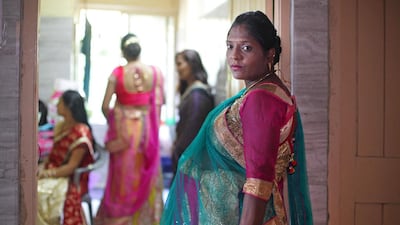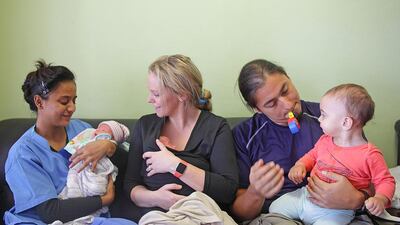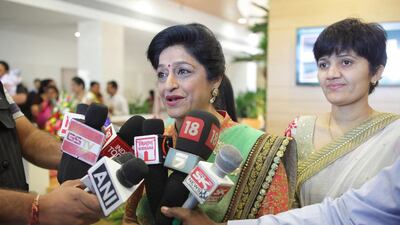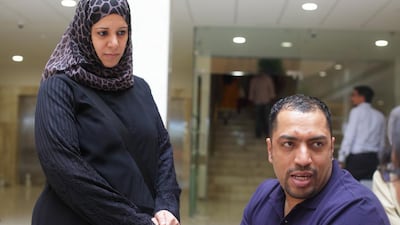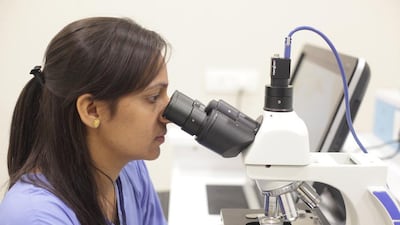ANAND, GUJARAT // In a private hospital suite in a small town in the western Indian state of Gujarat, Rami and Renée Hassan, a couple who live in Abu Dhabi, have their hands full with their three young children and they could not be happier.
When Ms Hassan, 35, who is from New Zealand and has lived in Abu Dhabi for the past five years and works in publishing, found out that she had a congenital uterus problem which meant she would be unable to carry children, the couple feared that their dream of raising a family that was genetically theirs would never be a reality.
But the husband and wife searched for solutions and came across the Akanksha Infertility clinic in Anand, a dusty town that is best known in India for being home to the household dairy brand Amul. The clinic offered the option of commercial surrogacy, which involved paying a fee for an Indian woman to carry their child.
Things worked out perfectly for the Hassans and the couple’s first child, a boy they named Theo, was born to a surrogate at the clinic just over a year ago. Then, a few weeks ago, they had twin girls, Suvi and Zara, through another Indian surrogate at the same clinic.
“It still seems a bit a surreal to have gone from nothing to this,” says Ms Hassan, who explains that they are aiming to return to Abu Dhabi next month once the twins have their passports. “It seemed like a win-win situation because the money really changes the surrogates’ lives.” The couple estimate that they have spent $150,000 in total on the surrogacy processes over the past couple of years, including their travel expenses.
But today, the same option would not be open to them after the Indian government in October revealed plans to ban commercial surrogacy for foreign couples. This was followed by notices being sent out to clinics last month by the Indian Council of Medical Research, a government body, ordering them to stop receiving new cases of foreigners for commercial surrogacy with immediate effect.
This has closed what had become a booming market for commercial surrogacy, as foreign couples flocked to India to take advantage of a practice that is illegal in many countries and competitively priced in India.
The women in India who become surrogates are normally from impoverished backgrounds and exploitation of such women has been cited as the reason for the decision to ban the practice.
But proponents of commercial surrogacy argue that the economic benefits for such women are huge, as the fee they receive lifts them out of poverty, allowing them to build houses, educate their children, and start businesses.
“We feel bad for future couples who won’t be able to go through the same process as us,” says Mr Hassan, 40, who works as an investment manager for Masdar and has been based in Abu Dhabi for six years. He is from the United States.
Ms Hassan adds that “they sighed a big sigh of relief that we just got in there in time”.
Commercial surrogacy is highly controversial, often referred to “rent a womb”, while the clinics that offer the service are sometimes dubbed as “baby farms” by critics. It is even likened to India’s outsourcing industry. The commercial surrogacy sector in India has an estimated annual value of $2.3 billion, according to the Confederation of Indian Industry.
Commercial surrogacy was legalised in India in 2002. It has been left largely unregulated, however. In countries including the UAE, the United Kingdom and Australia, commercial surrogacy is illegal. This provided an opportunity for India to capitalise on surrogacy as a growing area of its lucrative medical tourism industry.
The timing of the ban could not have been worse for Dr Nayna Patel, who runs the Akanksha Infertility Clinic in Anand and has pioneered commercial surrogacy in India, transforming the area into a hub for the industry and receiving worldwide media attention. Last Sunday, it was the launch of a luxurious, vast new hospital and research centre in the town, which she built with the foreign market in mind, with her business burgeoning over the years and to cater to the demand.
“It was a shock that the ban came overnight,” says Dr Patel. “I feel that the government is going to review this but we do not know what may be the outcome.”
Dr Patel’s clinic has delivered more than 1,000 babies through surrogate mothers and one-third of its business comes from foreigners. Indian nationals pay about 30 per cent less for the service than foreigners.
Foreign couples pay fees starting from about $30,000 at the clinic for surrogacy treatment. The surrogates receive about $10,000. In the United States, it would often cost upwards of $100,000 to use the services of a surrogate.
Dr Patel explains that India had managed to successfully build a good reputation worldwide for the practice.
“It’s a setback,” she says. “In every way India is losing out. First, the foreign couple pays the Indian embassy in their country and then the whole thing starts. Then when they come here, they go for dental treatment, plastic surgery, so that also gets affected indirectly.”
Dr Hitesh Patel, who is Dr Nayna Patel’s husband and handles the legal affairs at the clinic, says that it is inconsistent of the government to put a stop to foreigners availing of the procedure, while Indian nationals are still permitted to use such surrogacy arrangements. Those who are of Indian origin but have foreign passports are also banned.
“Why only foreigners? They’re bringing in business and foreign currency,” Dr Patel says. “Everyone is benefitting from them coming and we’re promoting medical tourism. I fail to understand why this is happening. Surrogates and doctors have put petitions in the supreme court.”
But he says he has “no idea” what will happen and if the decision to ban the practice might be overturned.
Manchi Bharucha, the medial director of NeuoSaante Pharmaceuticals in Mumbai and a reproductive endocrinologist, says there is exploitation in some cases when it comes to commercial surrogacy in India and the industry should certainly be better regulated.
“That doesn’t mean you should put a blanket ban on commercial surrogacy,” he says. “Many women in the world need surrogacy for medical conditions.”
Dr Bharucha says that the economic benefits of commercial surrogacy have proved to be enormous.
“From an economic point of view, surrogacy has given livelihood to numerous who were neglected economically,” he says. “In Mumbai, for example, there are a number of surrogate women who are not looked after by their husbands. The surrogate is often not able to work because she is not educated. She is offering her natural resources and what is wrong with that?”
Ganga Benn, 35, from a village outside of Anand, is seven months pregnant with a baby she is carrying for a couple for a couple form the UK through Dr Patel’s clinic. Her husband left her five years ago and she normally earns about 100 to 200 rupees a day as a housemaid. This is the second time she has been a surrogate and she says is saving the money for the education of her six-year-old daughter.
Meanwhile, there are couples who have been left in limbo. Poonam Parag, 33, and Enrico Vinay Desouza, 34, who are from California, had been planning for months to go ahead with surrogacy in Anand following five miscarriages. Having already made all their travel and visa arrangements, they decided to travel to Anand this month to go ahead with the IVF stage of the surrogacy treatment, but under the ban the clinic is unable to proceed to the next stage of implanting the embryo in a surrogate.
“I want to help the surrogate and in turn she’s helping me, so why ban it,” says Ms Parag. explaining that they have already spent tens of thousands of dollars, including taking time of work to travel to India. “Just put regulations in place. This is our last hope to have a child.”
Khalid and Rashida Abuidrees, 38 and 37 respectively, from Bahrain, are another couple who turned to Dr Patel in Anand when they failed to have children. A surrogate Indian mother in Anand is due to give birth to their first child any day now.
“We want to have another baby through surrogacy in India, but the doctor has said we have to wait some time to see what happens because of the problems with the government,” says Mr Abuidrees, who owns a construction and maintenance company in Bahrain. “I hope they clear these issues, so we can have another child.”
Economy to feel effects of surrogacy ban
The surrogacy industry has played a role in transforming the economy of Anand in India and financially bettering the lives of thousands of poor families and the government’s recent move to ban the practice will wipe out incomes, according to Dr Nayna Patel, who runs the Akanksha Infertility Clinic in the town.
“About 5,000 families in Anand are surviving on surrogacy,” says Dr Patel, whose clinic has been at the forefront of the country’s commercial surrogacy sector. “There are the surrogates, the nannies, the rickshaw drivers, the hoteliers who employ hundreds of peoples, the restaurants, the shops. There are so many people directly or indirectly surviving on surrogacy, so it’s going to be a huge economic impact as far as Anand is concerned.”
Reshma Sheikh, 34, who is from the town of Vadodara in Gujarat, this month delivered twin girls for an American couple at the clinic in Anand. Her family lost their home because of flooding.
Her husband Munna, 45, an auto rickshaw driver, says that the “ban should not be there because there are many poor people like me who have problems and will not be able to come out of them – one more door has been closed for the poor”. With the fee they receive, they plan to build a new house. Many surrogates use the money to start a business.
Urmila Bharati, 30, from the nearby city of Ahmedabad, last month started carrying a child for a couple from India, for which she says she will receive about $6,000, far less than the $10,000 she would have received from a foreign couple. Her husband earns 6,000 rupees as a labourer and they have an eight-year-old-son. She wants to spend the money on her son’s education.
“If there wasn’t a ban, I could have got more money and done more for my family,” says Ms Bharati.
business@thenational.ae
Follow The National's Business section on Twitter
